
When Minor League Baseball returns following the coronavirus pandemic, it will look nothing like it used to.
The Professional Baseball Agreement between Major League Baseball and MiLB expires on Sept. 30, and a proposal by MLB would eliminate 42 minor league teams and realign the remaining clubs for the 2021 season.
No matter how the PBA negotiations shake out, the outbreak of the novel coronavirus will likely have drastic effects on the 2021 season. Without an effective, widely disseminated vaccine, everything about the game day experience will be fundamentally altered for the near future.
From the box office to the turnstiles to the suite level to the seating bowl to the restrooms and everywhere in between, a day at the ballpark will be forced to strike a balance between entertainment and caution.
To get an idea of what the new normal might look like—whether that’s this summer or in 2021—Baseball America spoke to minor league operators across the country about the changes they anticipate making before the next time fans are allowed into their ballparks.
One of the first things that has to happen—to the best of a team’s ability—is to make sure the fans they let through the gates are healthy. Greater access to testing would make it easier, but it isn’t foolproof. There are already parks around the country which require fans to clear metal detectors before entering. Temperature checks might be the next step.
After a season spent ramping up excitement in the Madison, Ala., area, the new Rocket City Trash Pandas franchise was slated to open its gates for the first time this spring. Their new ballpark comes replete with all the modern amenities fans have come to expect—four-top tables, a 360-degree concourse, bars and other social areas in the outfield.
この記事は Baseball America の May/June 2020 版に掲載されています。
7 日間の Magzter GOLD 無料トライアルを開始して、何千もの厳選されたプレミアム ストーリー、9,000 以上の雑誌や新聞にアクセスしてください。
すでに購読者です ? サインイン
この記事は Baseball America の May/June 2020 版に掲載されています。
7 日間の Magzter GOLD 無料トライアルを開始して、何千もの厳選されたプレミアム ストーリー、9,000 以上の雑誌や新聞にアクセスしてください。
すでに購読者です? サインイン
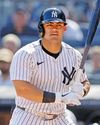
THE SERVICE TIME CONUNDRUM
MLB’s byzantine service time rules cloud rookie status and now PPI eligibility

LUIS TIANT WAS MLB'S MOST SUCCESSFUL CUBAN PITCHER
On a scouting trip to Cuba in 1957, Bobby Avila discovered 16-year-old righthander Luis Tiant on the island's Juvenile League all-star team.
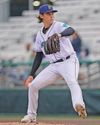
ORGANIZATION REPORT
Outfielder Heston Kjerstad's career has been unique, to say the least.

TOP 10 NL EAST
From the moment Thomas White stepped on a high school mound, he was viewed as the top lefthander available in the 2023 draft.

PREPARATION PAYS OFF
lowa politician J.D. Scholten makes a surprising return to pro ball at age 44

MAKING THE GRADE
Assessing the future value of graduated National League prospects
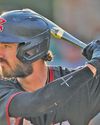
TOP 10 NL WEST
Even in high school, Bryce Eldridge could hit the ball a mile. The 6-foot-7 righthander could also touch 96 mph off the mound.
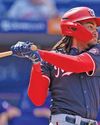
Wood Has Towering Upside- Nationals rookie James Wood also stands 6-foot-7 and also has game-changing power.
Aaron Judge and Oneil Cruz are 6-foot7 sluggers who stand out for their power in this year’s MLB Best Tools voting. Wood spent half of this season with Triple-A Rochester before making his MLB debut on July 1. While he was in the International League, he captured managers’ attention. Wood unanimously won Best Power Prospect and also claimed Most Exciting Player in a survey of league skippers. Wood hit .353/.463/.595 with 10 home runs in 52 games for Rochester. His .242 isolated slugging was the best for a player 21 or younger at Triple-A this season.
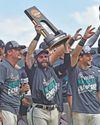
ROAD BLOCK?
Scholarship expansion puts mid-majors at a major disadvantage on the road to Omaha

ROYALS REVIVAL
A revamped and rejuvenated farm system has Kansas City ready to rebound